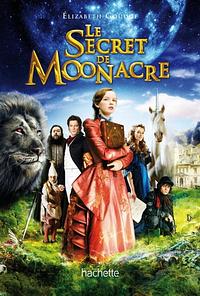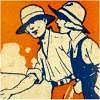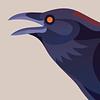You need to sign in or sign up before continuing.
Take a photo of a barcode or cover
Somehow I never found this book when I was a child. Which is a pity because 10 year old me would have loved it. Maria is an orphan sent to live with a remote relative. Her new home has many mysteries and secrets and there is big trouble between the manor, the village and the dark men of the forest. It is up to Maria to put right the wrongs of the past and so ensure happiness for everyone in the future. Looking at this with an adult’s eye it was easy to find fault - many of the tropes eg the plucky orphaned heroine felt cliched, the ending was too neat and pat, and the tone was overly moralistic in places. However I don’t think it is fair to judge and children’s novel by adult standards. As a children’s novel - a particular type of children’s novel - it works very well.
I adored this book as a child, and was curious to read it again. As soon as I started reading it, the scenes and even words surfaced in my mind, so I must have read it over and over again. I was worried that this might be one of those cases when you go back to read something years later, and you're horrified by the racism/sexism/whatever that your young eyes didn't see. This is definitely sexist, but not in a way that I couldn't squint past. The happy, forelock-tugging villagers also require some serious squinting. But on the whole, I enjoyed it. The bad guys make absolutely no sense in terms of behavior or economics, but that's OK. [return]The whole bucolic, countryside idyll aspect couldn't be a more dramatic contrast to "The Borrigbles", and I read the two books back-to-back.
I've heard a lot of good things about this book. But i wasn't impressed. I don't exactly what about it wasn't good? it just... didn't move me. Plus, getting married at 14? seriously.
Delightful. Reminds me of the kind of second-hand happiness I had when reading the passage from The Silver Chair in which Jill spends an evening at Cair Paravel. Would quite probably have been my favourite book if I had read it at a younger age; still very pleasant, but a little too sweet, like the sugar cookies Maria is always nibbling on!
emotional
funny
hopeful
lighthearted
slow-paced
Strong character development:
No
Loveable characters:
Complicated
Diverse cast of characters:
No
Flaws of characters a main focus:
No
Honestly, in light of all the nonsense J.K. Rowling has been spouting on social media lately, I should have seen the warning signs that The Little White Horse (a childhood favorite of hers) would not be very good.
One could argue that the horrendous sexism in this book was an unfortunate by-product of Goudge's time and culture, but then I think about other books featuring girl characters that were popular around the time that The Little White Horse was published (Little House on the Prairie, Nancy Drew, and Pippi Longstocking are a few I can name off the top of my head), and I can see why those have become classics while The Little White Horse has been largely forgotten. Maria, this book's lead character, is such a non-entity in what's supposed to be her story, with everything just happening to her, rather than her actually doing anything (except for the very VERY end of the story, but it feels less like a culmination of everything she's learned and more like too little, too late). Her personality consists of being sweet and ladylike...and nothing else. Any sign of real depth or agency in her character is quickly struck down by the supporting cast of human characters, who are supposed to be the "good guys" ("it's not ladylike to [do a thing]" "nip that female curiosity in the bud" "you can't help it, you're a girl"). And instead of proving them all wrong in the end, Maria just nods demurely and agrees with them!
Reading this while listening to the Wolf Children soundtrack makes me long for what this book could have been: a cozy, beautiful story in a lovingly rendered setting about compassion and forgiveness, with a lead character who has both strength in herself and kindness to others. Alas, The Little White Horse was not that book.
One could argue that the horrendous sexism in this book was an unfortunate by-product of Goudge's time and culture, but then I think about other books featuring girl characters that were popular around the time that The Little White Horse was published (Little House on the Prairie, Nancy Drew, and Pippi Longstocking are a few I can name off the top of my head), and I can see why those have become classics while The Little White Horse has been largely forgotten. Maria, this book's lead character, is such a non-entity in what's supposed to be her story, with everything just happening to her, rather than her actually doing anything (except for the very VERY end of the story, but it feels less like a culmination of everything she's learned and more like too little, too late). Her personality consists of being sweet and ladylike...and nothing else. Any sign of real depth or agency in her character is quickly struck down by the supporting cast of human characters, who are supposed to be the "good guys" ("it's not ladylike to [do a thing]" "nip that female curiosity in the bud" "you can't help it, you're a girl"). And instead of proving them all wrong in the end, Maria just nods demurely and agrees with them!
Reading this while listening to the Wolf Children soundtrack makes me long for what this book could have been: a cozy, beautiful story in a lovingly rendered setting about compassion and forgiveness, with a lead character who has both strength in herself and kindness to others. Alas, The Little White Horse was not that book.
adventurous
emotional
inspiring
mysterious
reflective
medium-paced
Plot or Character Driven:
Character
Strong character development:
Yes
Loveable characters:
Yes
Diverse cast of characters:
No
Flaws of characters a main focus:
Complicated
This was a comfort book throughout my pre-teen years. I would say that is the best age to read it. It ties the country landscape with magical elements and a happy ending that makes growing up seem a little less scary. The narrative also encourages a strong connection to that landscape and the protection of animal life. I would recommend it to any young person who is a little anxious about their future and would like to hold on to their imagination.
I first read this in 1981.
I'm sure I read somewhere that this is one of JK Rowling's favourite children's books and there's definitely a lot of food in it. (She's spoken at length of her love of food in books.)
I too love descriptions of food. I think you get it a lot in post-war books - this was first published in 1946 - because of rationing. So the food descriptions are amazing and luscious, and one of Maria's features, as well as her 'exquisitely tiny' feet and her bravery, is her extremely healthy appetite. Hurrah.
Elizabeth Goudge's adult books are a tad Godly for my tastes, and this is pretty Godly it must be said, but in a very charming simple way that doesn't seem too over the top, partly because it's set in the 1840s. (Likewise the idea that Maria gets married a year after the action in the book - when she's all of fourteen - doesn't seem as disturbing as one might expect. Things are different in the slightly magical world of Victorian Moonacre.)
Maria's adventures as she explores Moonacre and learns about the mistakes of her ancestors both distant and nearer in time are exciting and delightful.
I do find this book very comforting, as comforting as Maria finds the knowledge of the crystal beads sewn onto her boots, even though no one can see them.
I'm sure I read somewhere that this is one of JK Rowling's favourite children's books and there's definitely a lot of food in it. (She's spoken at length of her love of food in books.)
I too love descriptions of food. I think you get it a lot in post-war books - this was first published in 1946 - because of rationing. So the food descriptions are amazing and luscious, and one of Maria's features, as well as her 'exquisitely tiny' feet and her bravery, is her extremely healthy appetite. Hurrah.
Elizabeth Goudge's adult books are a tad Godly for my tastes, and this is pretty Godly it must be said, but in a very charming simple way that doesn't seem too over the top, partly because it's set in the 1840s. (Likewise the idea that Maria gets married a year after the action in the book - when she's all of fourteen - doesn't seem as disturbing as one might expect. Things are different in the slightly magical world of Victorian Moonacre.)
Maria's adventures as she explores Moonacre and learns about the mistakes of her ancestors both distant and nearer in time are exciting and delightful.
I do find this book very comforting, as comforting as Maria finds the knowledge of the crystal beads sewn onto her boots, even though no one can see them.
I picked this book up on a total whim, I have the vaguest recollections of a tv series by the same name, which may or may not have existed. But if it did I think I found it boring. Still I’m a horse fan. It was cheap, and short. I gave in.
And I’m so glad that I did. It is quite obvious that this book is not a modern one. First published in 1946 and set in Victorian England. The book is full of elements that date it. There is an innocence and such a positive outlook that is almost too much. The characters themselves aren’t all that well-drawn, being almost stereotypes. And the plot is simplistic and slightly overly religious.
Full review: http://www.susanhatedliterature.net/2006/05/10/the-little-white-horse/
And I’m so glad that I did. It is quite obvious that this book is not a modern one. First published in 1946 and set in Victorian England. The book is full of elements that date it. There is an innocence and such a positive outlook that is almost too much. The characters themselves aren’t all that well-drawn, being almost stereotypes. And the plot is simplistic and slightly overly religious.
Full review: http://www.susanhatedliterature.net/2006/05/10/the-little-white-horse/
The writing in this book is absolutely exquisite - almost making up for the fact that the messages in this book are way off base. The main character Maria is a fiery, curious girl but is constantly being told that these qualities are bad and exclusively feminine...
She must not ‘quarrel’ or act upon her inquisitiveness - these are BAD and it is made clear to the reader that these are seen as exclusively feminine traits.
There’s a character who literally says that he hates females - he literally says this. The entire household prides itself on having no females within the house for many years before Maria arrives.
We love a bit of 19th century sexism.
She must not ‘quarrel’ or act upon her inquisitiveness - these are BAD and it is made clear to the reader that these are seen as exclusively feminine traits.
There’s a character who literally says that he hates females - he literally says this. The entire household prides itself on having no females within the house for many years before Maria arrives.
We love a bit of 19th century sexism.
This is one of my favorites. Of course, I have a predisposition to enjoy fantasy; call it a fault if you must; but even so this is a marvelous book. The main character, Maria Merryweather, is carefully and realistically developed, as are all the other characters. There is also an element of mystery throughout the book, and a satisfying end. In the immortal words of Larry the Cucumber: "I laughed, I cried... It moved me, Bob." Even if you think you're too old to really enjoy children's books, you should revert to your childhood long enough to read this book!





